How Gordon Moore Made Technology More Affordable, Accessible for Everyone
It’s with a heavy heart that the technologist community bids farewell to Gordon Moore, co-founder of Intel and visionary behind Moore's Law. Our community has lost one of the most innovative technologists to ever live. Unlike some antics and interviews you might see from some of today’s technologists, Gordon Moore funneled his sizable wealth into projects that advised data science, environmental conservation and astronomy.
Almost everyone has heard of Moore’s Law, which states that the number of transistors on a microchip will continue to double every two years, resulting in a dramatic increase in computing power. But Gordon Moore and his foundation are also directly responsible for that Jupyter Notebook you are using and that NumPy python package that is in every single AI/ML software running today. On the astronomy side, the amazing images from the Event Horizon Telescope, the South Pole Telescope and the Thirty Meter Telescope all exist because of Gordon Moore.
What is Moore’s Law?
Moore's Law is a concept put forth by Gordon Moore in 1965, which states that the number of transistors on a microchip double approximately every 18-24 months. The result of this growth is an exponential increase in processing power, performance, and speed. For over five decades, this law has been the driving force behind the advancement of technology. As a result, devices have become smaller, more powerful, and more affordable, and technological progress has been faster than ever before.


Impact of Moore’s Law on Technology
Reduction of costs and increase in processing power
One of the significant impacts of Moore’s Law is the reduction in costs associated with technological advancement. The exponential growth of processing power and the reduction in device size have resulted in more affordable products, which has led to increased accessibility for the public. The accessibility and greater affordability of technology have been a direct result of Moore’s Law. This accessibility has enabled more people to use technology, which has resulted in significant changes in the way we live, work, and communicate. People around the world are now connected in a way that was once impossible, and technological advancements have contributed to significant improvements in areas such as education, healthcare, and transportation.
Artificial Intelligence Advancements
Moore’s Law has also driven artificial intelligence advancements, with exponentially growing processing power leading to the development of smarter machines. The field of machine learning, which is a subfield of AI, is heavily dependent on the ability to handle large amounts of data quickly and efficiently. This has been made possible due to the exponential growth in processing power, which has resulted in machine learning algorithms becoming more sophisticated and complex than ever before.
Artificial intelligence has come a long way, and much of that progress can be attributed to the ever-increasing computing capacity of machines. With this incredible capability, AI systems can now process massive amounts of data, store vast amounts of information, and recognize patterns in a fraction of the time it once took. It’s no surprise that this technological advancement has led to some exciting breakthroughs in the field of artificial intelligence. Thanks to the power of computing, machines can now perform complex tasks, make intelligent decisions, and provide invaluable insights that can help solve some of the world's most pressing problems. As computing continues to evolve, we can only imagine what incredible feats of AI will be possible in the future.
Gordon Moore’s Legacy Beyond Intel and Moore’s Law
Gordon Moore was not just a leader in the tech industry; he was also a philanthropist. The Gordon and Betty Moore Foundation, launched in 2000, has invested $5 billion in many projects, including supporting data science, environmental conservation, and astronomy research. Moore’s commitment to environmental conservation has seen the creation of the Moore Center for Ecosystem Science and Economics at Stanford University, which works on research to promote sustainability and conservation.


Impact on the Future of Technology
Moore’s Law has been the driver of exponential technological growth, but there are concerns about the future and the limitations of the law. There are limits to how small transistors can be made, and scientists are already beginning to look beyond traditional silicon-based technology, toward developing technologies that can sustain the rapid growth made possible by Moore’s Law. Even though the limitations of the law are being reached, Moore’s Law and the impact of Gordon Moore on technology will be remembered in the years to come.
Gordon Moore is a visionary whose impact on technology is immeasurable. His foresight has been instrumental in propelling technological advances for several decades. Moore also put his wealth into ventures that reflect his values, such as data science, environmental conservation, and astronomy. With his investments, he is making a difference in a variety of areas beyond the realm of technology. It’s exciting to see someone with such a forward-thinking mentality envision a future that positively impacts our world in so many ways. Gordon Moore’s legacy is one that will continue to inspire and shape the future for generations to come.

